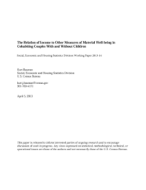The Relation of Income to Other Measures of Material Well-being in Cohabiting Couples With and Without Children
The Relation of Income to Other Measures of Material Well-being in Cohabiting Couples With and Without Children
Introduction
Research has established that married couples in the United States are more likely than cohabiting couples to pool income and share resources within the household (Bauman 1999, Kenney 2004, Oropesa, Landale and Kenkre 2003). However, recent work by Kenney (2003) and Manning and Brown (2006) indicate that the degree of sharing, and its u se to benefit children in particular, are different when cohabitors have children in the household than when they do not. They also note differences by race and Hispanic origin that were not fully accounted for in early research. This paper builds on previous research using the Survey of Income and Program Participation to examine how income earned by household members contribute to the well-being of the household in households of varying composition.




